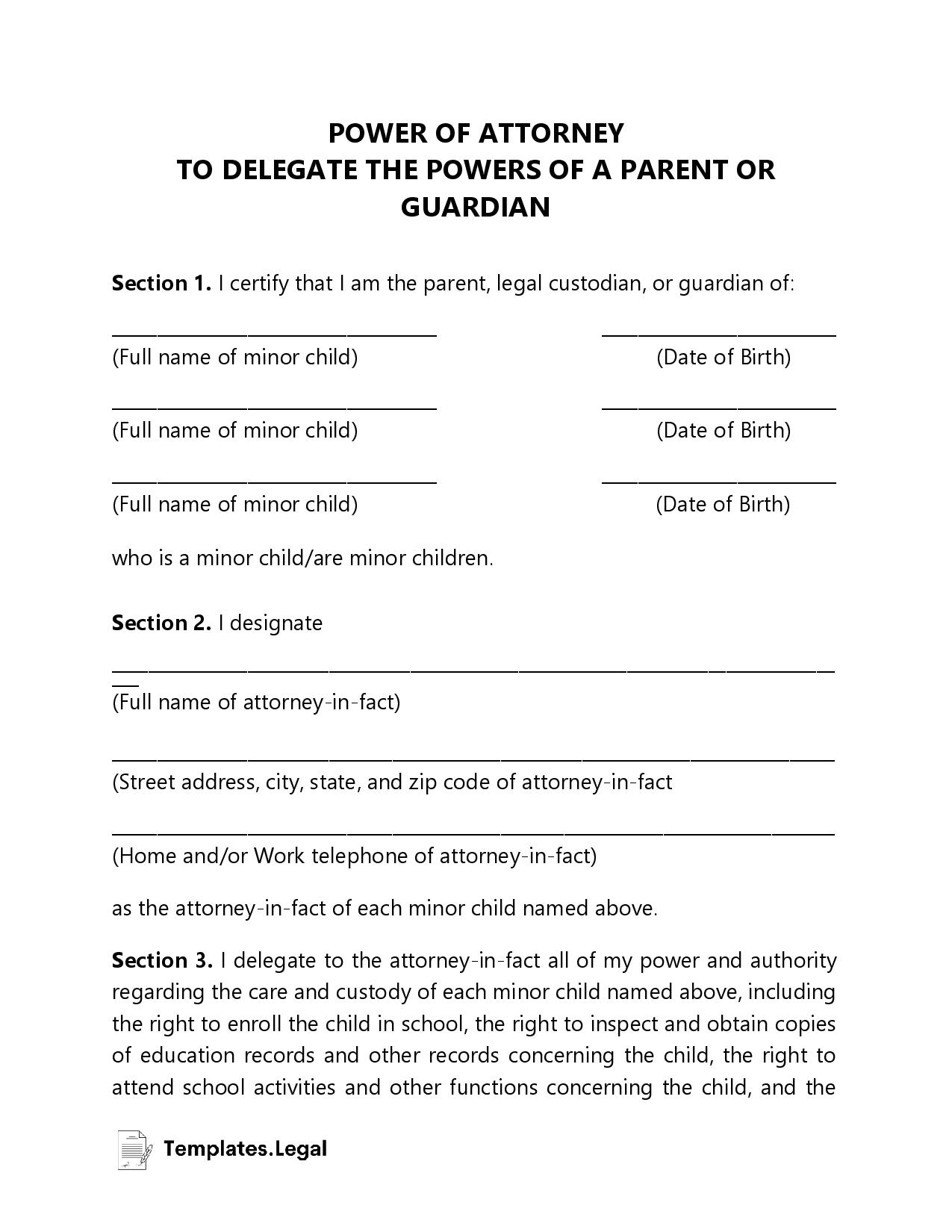Minor (Child) Power of Attorney Templates
Minor power of attorney (also known as child power of attorney in some areas) is a beneficial resource for parents and guardians. Here’s what you should know about it.
Minor (Child) Power of Attorney By State
What Is Minor Power Of Attorney?
Minor power of attorney is a legal process in which an authorized individual (typically a parent or legal guardian) can give parenting rights to someone else for a temporary period. This is mainly used in times when parents or guardians will be away from the child, and someone else needs to perform the same role.
In this context, “temporary” means the minor power of attorney is not supposed to be permanent, and in most cases, is not overly long. For example, suppose the parents are military personnel deploying overseas. In that case, a temporary babysitter who isn’t a legal guardian may get minor power of attorney for the parent’s deployment duration.
Similarly, the minor power of attorney allows babysitters to pick up children from school or make medical decisions on their behalf without needing additional authorization from the parents. This is most helpful in emergencies and for planned times when parents or guardians cannot fulfill their regular duties.
Does Minor Power Of Attorney Vary By State?
Laws are similar between states but rarely identical.
For example, in Washington state, the law provides general guidance for authorizing minor power of attorney and clarifying the structure of authority. In this state, even if someone holds minor power of attorney, guardians’ decisions supersede that when available.
This means a babysitter cannot decide to give a minor medical treatment the guardian has refused.
Meanwhile, Maryland has easily-accessible forms for standby guardianships in case parents become mentally incapacitated, physically disabled, subject to adverse immigration actions, or otherwise generally unable to function.
States typically allow you to delegate powers when you want to transfer them, but scheduling it ahead of time can be more difficult.
Can I Get A Free Minor Power Of Attorney Form?
Yes! These forms are generally available online. You may also be able to get a free minor power of attorney template from your attorney or courts and government offices dealing with guardianships and similar matters.
Availability varies by region, so be sure to contact someone before you go visit.
The critical thing to remember here is that forms can vary by state. They may require different information, so you should always use the state-specific form instead of looking for a general minor power of attorney form.
If a child and temporary guardian will be moving across state lines for any reason, you may need multiple forms authorized in each state. This is somewhat harder than getting a form for just one state, so plan ahead if possible.
Places in states might accept a minor power of attorney form from a different state, but there’s no guarantee of that, and every possibility they’ll err on the side of caution instead.
Forms Step By Step
Filling in the forms is usually as easy as writing the information in each blank area. This generally includes selecting the intended guardian, providing dates of birth, listing who the current parents and/or guardians are, and providing residential information.
Many forms also have additional sections that limit when or where someone has minor power of attorney. For example, a form may declare that the authorized individual only has the powers from 3 PM to 6 PM or September to June.
After filling in each of the blanks, which are generally self-explanatory, you need to get the form authorized by a third-party witness. In most states, this requires the services of a notary public and/or two independent, unrelated witnesses. Some states only have recommendations, so check the signing requirements for your state.
Notary publics are generally better than other types of witnesses when permitted. Among other things, they usually have a record of services (known as a “notary journal”) that can help provide proof if there’s ever a question about the validity of the signing process.
The document is usually complete once it’s witnessed or notarized and typically does not need to be filed with a court or any other government body. Guardians may enter it into court records just to preserve the paper trail, but this isn’t usually required.
Frequently Asked Questions
Here are some common questions that people ask.

